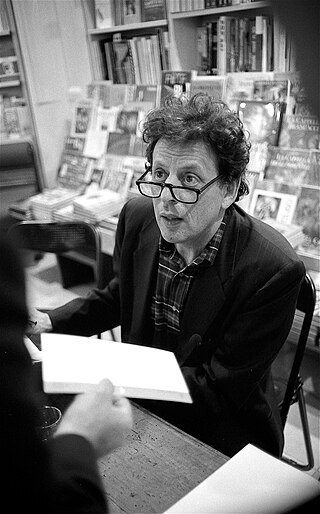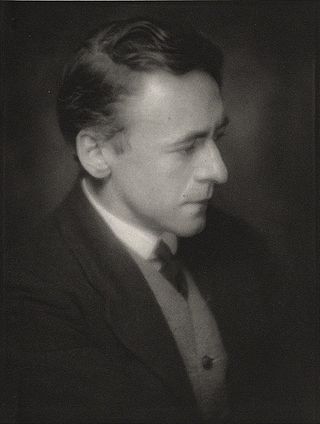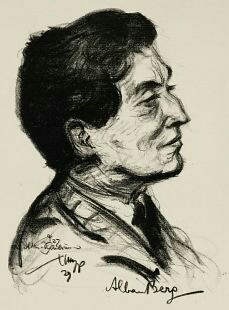Related Research Articles

Philip Glass is an American composer and pianist. He is widely regarded as one of the most influential composers of the late 20th century. Glass's work has been associated with minimalism, being built up from repetitive phrases and shifting layers. Glass describes himself as a composer of "music with repetitive structures", which he has helped evolve stylistically.

Sir Arnold Edward Trevor Bax, was an English composer, poet, and author. His prolific output includes songs, choral music, chamber pieces, and solo piano works, but he is best known for his orchestral music. In addition to a series of symphonic poems, he wrote seven symphonies and was for a time widely regarded as the leading British symphonist.

Alban Berg's Violin Concerto was written in 1935. It is probably Berg's best-known and most frequently performed instrumental piece, in which the composer sought to reconcile diatonicism and dodecaphony. The work was commissioned by Louis Krasner, and dedicated by Berg to "the memory of an angel", Manon Gropius. It was the last work that Berg completed. Krasner performed the solo part in the premiere at the Palau de la Música Catalana, Barcelona, on 19 April 1936, after the composer's death.
Sir John Kenneth Tavener was an English composer, known for his extensive output of choral religious works. Among his best known works are The Lamb (1982), The Protecting Veil (1988), and Song for Athene (1993).

Music for 18 Musicians is a work of minimalist music composed by Steve Reich during 1974–1976. Its world premiere was on April 24, 1976, at The Town Hall in New York City. Following this, a recording of the piece was released by ECM New Series in 1978.
Steven Isserlis is a British cellist. He has had a distinguished career as a soloist, chamber musician, educator, author and broadcaster. Acclaimed for his profound musicianship, he is also noted for his diverse repertoire, command of phrasing, and distinctive sound which is deployed with his use of gut strings.

Salome, Op. 54, is an opera in one act by Richard Strauss. The libretto is Hedwig Lachmann's German translation of the 1891 French play Salomé by Oscar Wilde, edited by the composer. Strauss dedicated the opera to his friend Sir Edgar Speyer.

The Klavierstücke constitute a series of nineteen compositions by German composer Karlheinz Stockhausen.

Sonatas and Interludes is a cycle of twenty pieces for prepared piano by American avant-garde composer John Cage (1912–1992). It was composed in 1946–48, shortly after Cage's introduction to Indian philosophy and the teachings of art historian Ananda K. Coomaraswamy, both of which became major influences on the composer's later work. Significantly more complex than his other works for prepared piano, Sonatas and Interludes is generally recognized as one of Cage's finest achievements.

A Celtic Requiem (Requiem for Jenny Jones) is a requiem by the English composer John Tavener, written in 1969. It is written for soprano, children's choir and orchestra.
"Song for Athene" is a musical composition by British composer John Tavener with lyrics by Mother Thekla, an Orthodox nun, which is intended to be sung a cappella by a four-part choir. It is Tavener's best known work, having been performed by the Westminster Abbey Choir conducted by Martin Neary at the funeral service of Diana, Princess of Wales, on 6 September 1997 as her cortège departed from Westminster Abbey.
The Protecting Veil is a late 20th-century classical composition for cello and strings by British composer John Tavener. It was on the short list of nominees for the 1992 Mercury Prize.
Stephen David Layton is an English conductor.

The Holst Singers are an amateur choir based in London, England. The choir is named indirectly after the English composer Gustav Holst, taking its name from the Holst Room at St Paul's Girls' School, the venue for rehearsals during the choir's early years.

Klang —Die 24 Stunden des Tages is a cycle of compositions by Karlheinz Stockhausen, on which he worked from 2004 until his death in 2007. It was intended to consist of 24 chamber-music compositions, each representing one hour of the day, with a different colour systematically assigned to every hour. The cycle was unfinished when the composer died, so that the last three "hours" are lacking. The 21 completed pieces include solos, duos, trios, a septet, and Stockhausen's last entirely electronic composition, Cosmic Pulses. The fourth composition is a theatre piece for a solo percussionist, and there are also two auxiliary compositions which are not part of the main cycle. The completed works bear the work (opus) numbers 81–101.
Matthew Rooke is a musician, composer and performer who also works in producing and directing theatre work. Born in England, he is of Scottish and Gabonese descent. His work spans an eclectic and diverse range of forms and creative partners, spanning the worlds of opera, classical music and contemporary jazz, rock and traditional music. His musical partners and collaborations range from Sir John Tavener, Billy Childish, Nitin Sawhney, Ric Sanders, Fred Thelonious Baker, The James Taylor Quartet and The National Youth Orchestra of Scotland.

The Lamb is a choral work written in 1982 by British composer John Tavener (1944–2013). It is a setting of music to the William Blake poem "The Lamb" from Blake's collection of poems Songs of Innocence and of Experience (1789). It is one of Tavener's best known works. Written for unaccompanied SATB choir, the music is minimalistic and combines chromaticism with more conventional harmony.

Brighton Festival Chorus is a large choir of over 150 amateur singers based in Brighton, UK. One of the country's leading symphony choruses.., and considered "one of the jewels in the city's musical crown", BFC performs in major concert halls throughout Britain and Europe, particularly in Brighton and London.
Worldes Blis is a motet for orchestra by the British composer Peter Maxwell Davies. It was first performed at The Proms on 28 August 1969 by the BBC Symphony Orchestra conducted by the composer.

The Finnish composer Jean Sibelius (1865–1957) was one of the most important symphonists of the early twentieth century: his seven symphonies, written between 1899 and 1924, are the core of his oeuvre and stalwarts of the standard concert repertoire. Many of classical music's conductor–orchestra partnerships have recorded the complete set, colloquially known as the "Sibelius cycle". Specifically, the standard cycle includes:
References
- ↑ Tavener, John. "The Veil of the Temple" . Retrieved 14 November 2016.
- ↑ Anastasia Tsioulcas (12 November 2013). "Remembering 'Holy Minimalist' Composer John Tavener". NPR Music . Retrieved 13 November 2013.
- ↑ Michael White, "A Time for Reflection", BBC Music Magazine, Vol. 22 No. 2 (December 2013): p. 29.
- 1 2 Layton, Stephen. "Sir John Tavener (1944 – 2013)" . Retrieved 14 November 2013.
- 1 2 "The Veil of the Temple" (PDF). CD notes. Chester Music. 2003. Retrieved 12 November 2016.
- ↑ "The Veil of the Temple" (PDF). CD notes. Signum Records Ltd. 2013. Retrieved 12 November 2016.